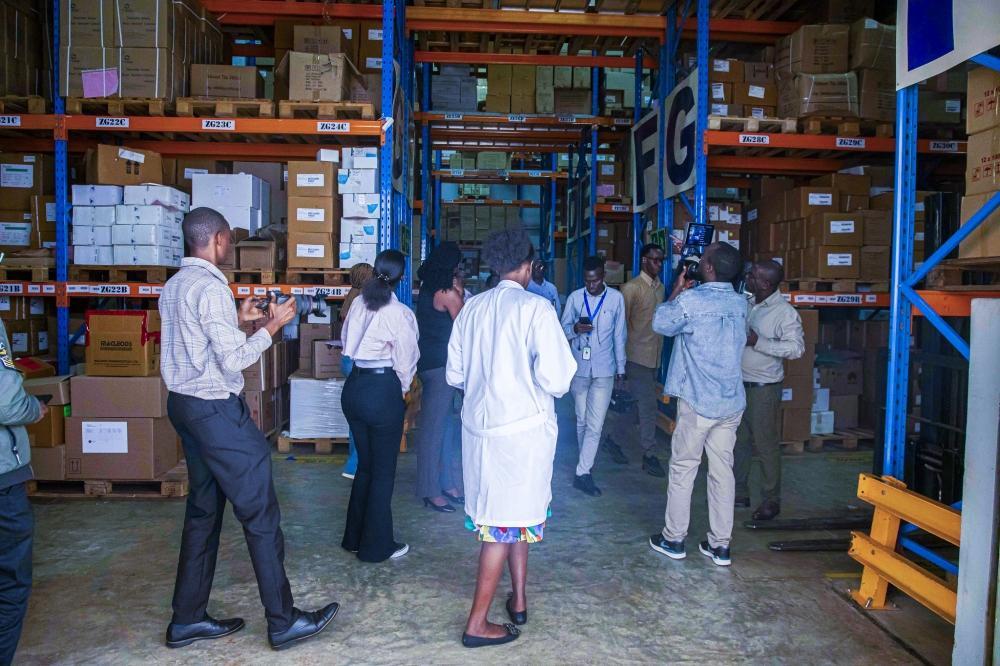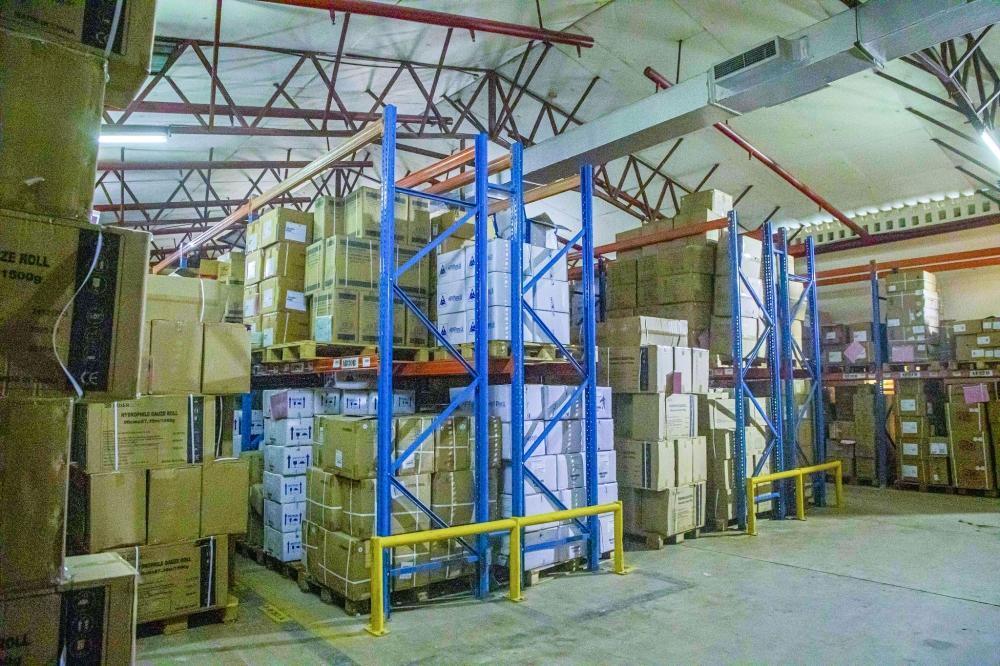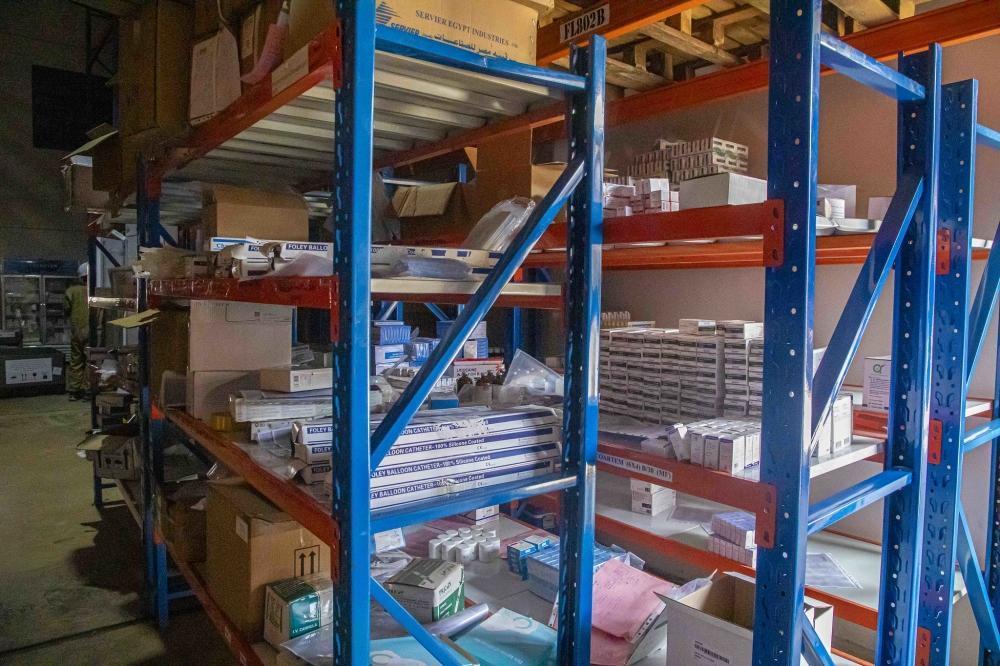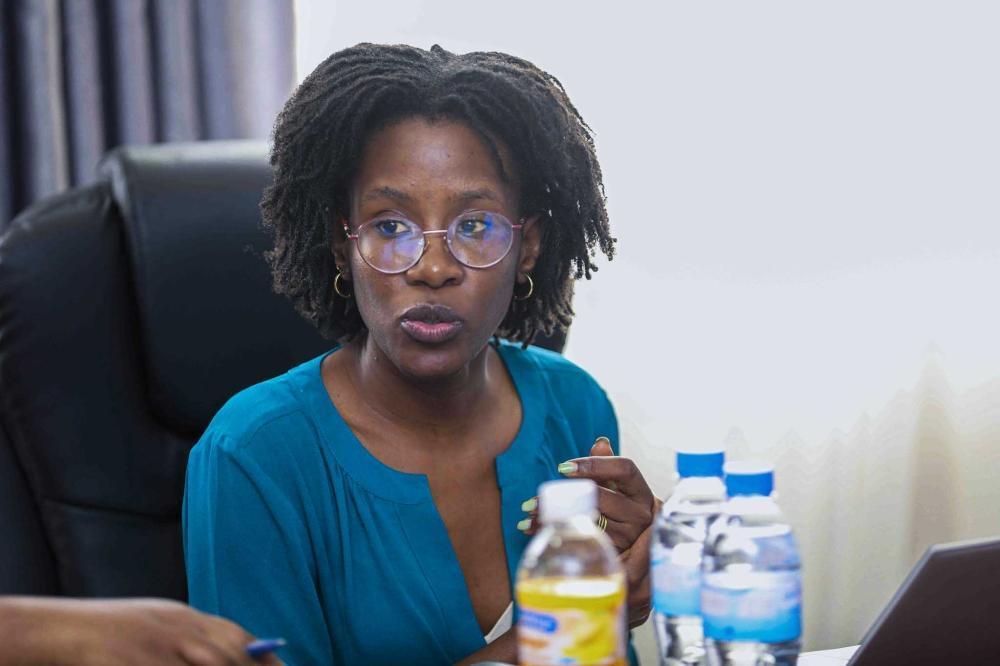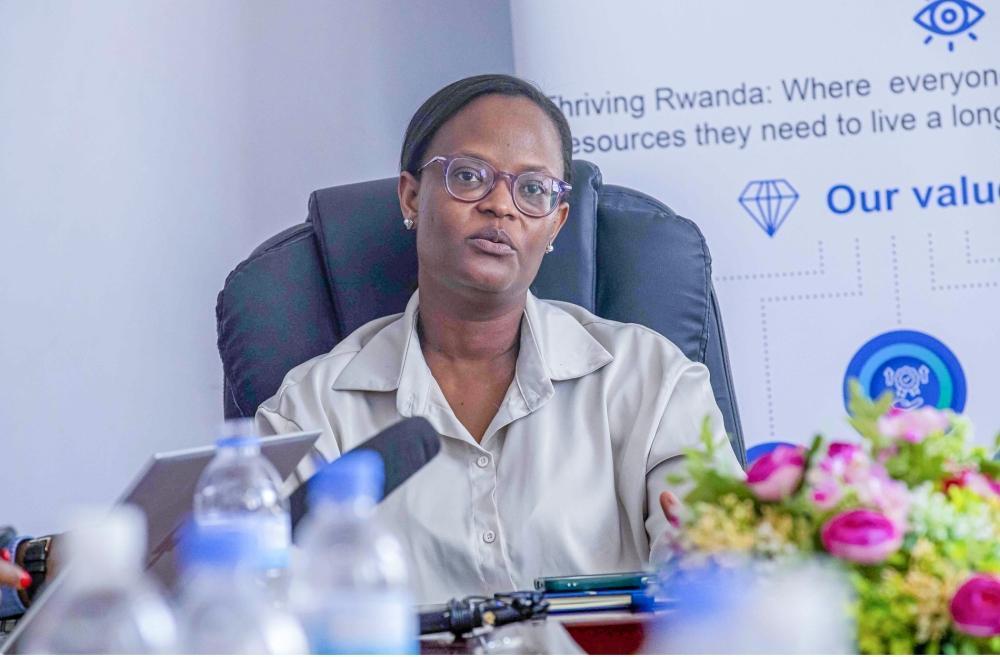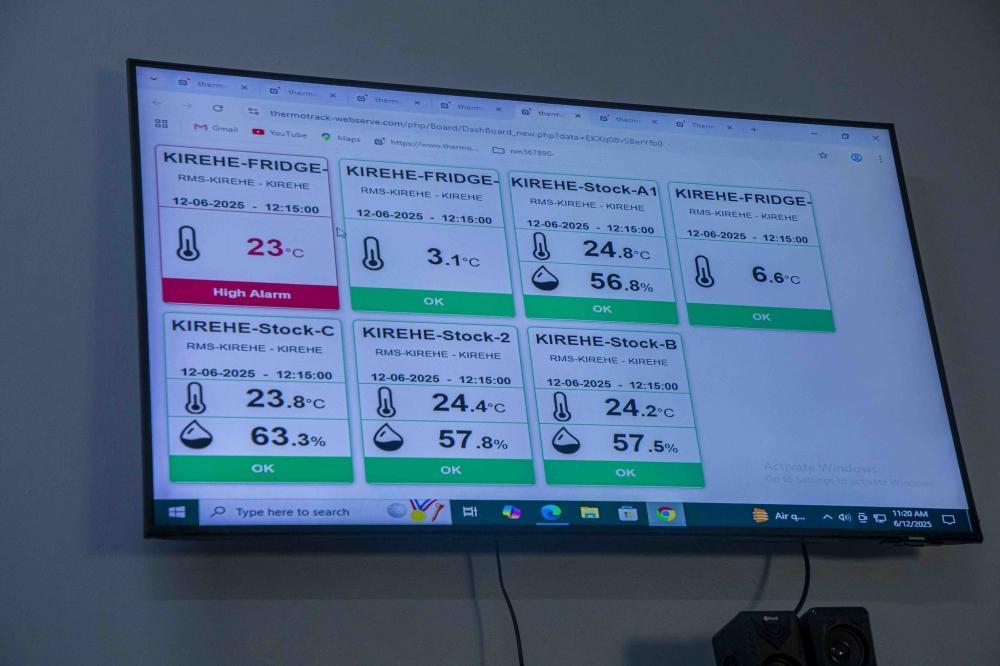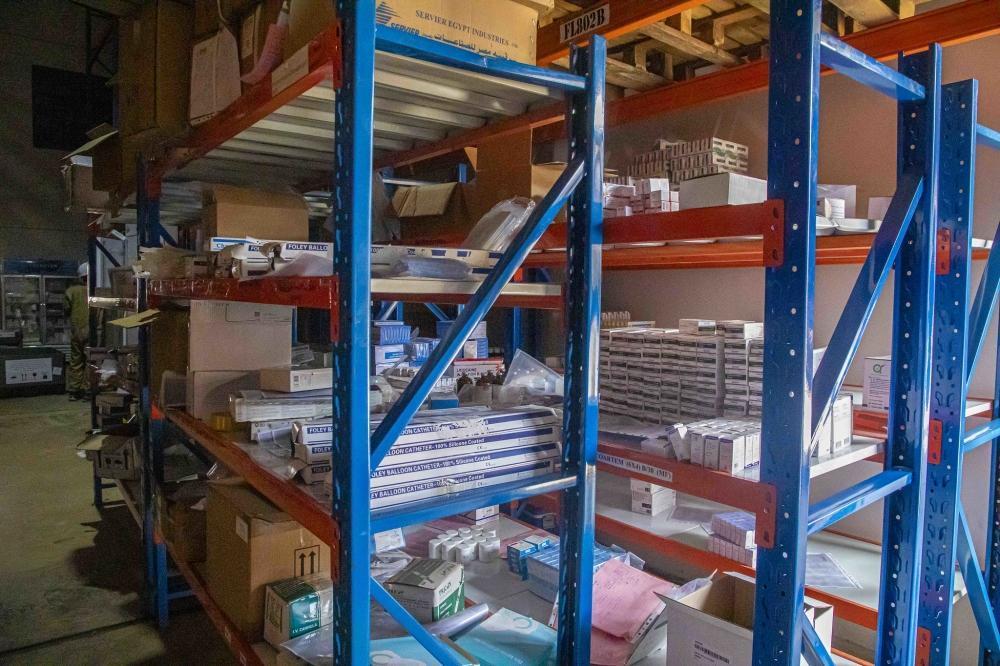Africa-Press – Rwanda. Rwanda Medical Supply Ltd. (RMS), established in 2021, has been a driving force in advancing Rwanda’s healthcare system by ensuring the efficient procurement, storage, and distribution of essential medical supplies. According to officials, as the nation ambitiously works toward building a more resilient system, it also lays the foundation for a more equitable healthcare future.
RMS envisions a thriving Rwanda where everyone has access to the health resources necessary for a long and fulfilling life. By 2030, it aspires to become Africa’s leading health supply chain institution, ensuring the consistent availability and affordability of quality-assured health commodities.
Inside Rwanda Medical Supply’ store at Kacyiru in Kigali. All photos by Kellya KEZA
According to Alliance Ishimwe, the Strategic Advisor at Rwanda Medical Supply Ltd. (RMS), one of the institution’s core mandates is to manage Rwanda’s end-to-end health supply chain. This includes quantifying, procuring, storing, and distributing essential and program-specific health commodities—often on behalf of donors—to public health facilities nationwide.
RMS operates an extensive national network of 26 regional warehouses—one in each district—except for Gasabo, Kicukiro, Nyarugenge, and Bugesera, which are serviced through a centralized hub located in the Kigali Special Economic Zone.
At its Kacyiru headquarters, where several operations are centralized, efficiency is embedded into every detail. Automated systems and temperature-monitoring technology ensure that medicines and medical equipment are stored under optimal conditions. In the event of any temperature fluctuation, the system immediately alerts technicians, allowing for swift intervention and prevention of product spoilage.
From top referral hospitals to community health workers in the country’s most remote cells, RMS has created an integrated network connecting Rwanda’s administrative and healthcare systems.
“We serve 8 referral hospitals, 4 provincial hospitals, 36 district hospitals, 508 health centers, 1,160 health posts, and 58,445 community health workers across the country,” Ishimwe explains.
Stocking Rwanda’s health system
As noted, Rwanda Medical Supply Ltd. (RMS) manages a growing portfolio that includes over 536 items from the national Essential Medicines List, along with 400 specialized medical supplies in areas such as cardiology, renal care, and antibiotics. This portfolio also includes 43 cardiology products, 123 laboratory diagnostic items, over 1,100 types of implants, supplies for dialysis, and 400 pieces of equipment used in minimally invasive surgery. Preparations are currently underway to expand this range to include transplant medicines, cardiac surgery tools, and assistive devices.
RMS serves 8 referral hospitals, 4 provincial hospitals, 36 district hospitals, 508 health centers, 1,160 health posts, and 58,445 community health workers across the country
National assessments show high availability of medicines at health facilities: 91.3% at hospitals, 96.4% at health centers, with an overall availability rate of 94.6%.
RMS’s operational process encompasses national needs quantification in collaboration with stakeholders, a competitive tendering process, procurement (both directly and on behalf of donors), quality assurance in partnership with the Rwanda FDA, warehousing, distribution, and continuous stock monitoring.
Strategic procurement and technology
RMS’s impact is also evident in its strategic procurement practices. By establishing direct partnerships with leading global manufacturers such as Pfizer, GE Healthcare, Haier, Zeiss, and Thermo Fisher Scientific, RMS has significantly reduced costs while improving access to advanced medical technologies.
“One of the major investments has been in endoscopy machines, which were initially acquired at $650,000 per unit through distributors. By sourcing directly from manufacturers, RMS reduced the cost to $220,000—enabling installations in major hospitals such as CHUK, King Faisal, and Kanombe Military Hospital,” said Ishimwe.
Ishimwe Alliance, Strategic Advisor to the CEO, during the meeting
She added, “The cost of a total hip replacement implant, previously priced at $4,000, now stands at just $500 thanks to more efficient procurement strategies.”
Rwanda now hosts East Africa’s only Zeiss Kinevo 900s robotic surgical microscope, located at King Faisal Hospital. This state-of-the-art technology enhances surgical precision and patient outcomes, positioning Rwanda as a regional leader in advanced medical procedures.
Inventory systems and emergency preparedness
RMS maintains strict minimum and maximum stock levels for all items, along with emergency reserves to enable rapid response to public health threats such as Marburg virus, Mpox, and others.
Distribution is supported by Rwanda’s robust road infrastructure. According to available data, 74% of all health facilities are located within 25 kilometers of a district warehouse, and only 15 facilities (0.8%) are more than 50 kilometers away.
The RMS logistics fleet includes both standard and cold-chain trucks. To further enhance distribution efficiency, RMS partners with third-party logistics providers such as Zipline and Kasha Rwanda.
“In December 2024, Zipline alone delivered medical products to 1,342 facilities—over 245,000 units across 4,563 separate shipments. By January 2025, although the number of facilities served dropped to 241, the total number of units delivered rose to over 1.6 million. This shift reflects improved targeting and more efficient utilization of resources,” Ishimwe explained.
A digital supply chain
In response to operational challenges with its previous digital tools, RMS is transitioning from the E-LMIS system to a new SAP/ERP platform, which offers end-to-end supply chain visibility and integration with Electronic Medical Records (EMR).
Future digital strategies include using AI for forecasting and market intelligence, expanding the product portfolio, and launching innovative procurement models like reverse auctions and online platforms such as Axmed.
Global certification and expansion
RMS is working toward ISO 9001:2015 certification, aiming to complete audits and assessments by March 2025. This international standard will position RMS for even greater credibility, productivity, and customer satisfaction.
The next phase also includes the construction of a new modern warehouse, the maturation of the ERP system, and expansion into specialized medical fields such as neurology, cardiovascular, nephrology, and organ transplants.
The newly designed network will focus on five main hubs located in Kayonza (Eastern), Musanze (Northern), Karongi (Western), Huye (Southern), and Free Zone Kigali (Gasabo), to improve regional responsiveness.
Safety and quality assurance
According to Ignace Ndekezi, the Head of Procurement and Quantification at RMS, the institution selects suppliers from manufacturing companies that are certified by the World Health Organization (WHO). After the importation of these medical products, the Rwanda Food and Drugs Authority (FDA) conducts thorough laboratory tests to approve the drugs as legal and certified for use in the country.
“We have a team that handles quality assurance. They carry out additional inspections on all important aspects, including packaging and expiry dates. Additionally, we involve WHO experts for further verification. Once all is confirmed, we then stock the medicines, ready for local distribution,” he explained.
Ndekezi added that the inspection process doesn’t stop there. Rwanda FDA also conducts post-market surveillance to ensure that even products that initially arrived in good condition haven’t deteriorated over time, which could pose health risks to consumers.
“If we identify a product with issues, we immediately collect and return it to the manufacturer, who replaces it with fresh supplies. We keep monitoring the drugs continuously until the last dose is consumed,” he said.
Diana Mutoni, the Deputy CEO at Rwanda Medical Supply speaks to the journalists after a guided tour.
Meanwhile, Diana Mutoni, the Deputy CEO, noted that the most commonly used medications in Rwanda include paracetamol and amoxicillin. When it comes to medical commodities, gloves, gauze, and serum are among the most frequently consumed items across the country.
In 2019-2020, the satisfaction rate for health facilities receiving the drugs they ordered stood at just 29%, according to a performance audit. By December 2024, RMS had lifted this figure to 75%, showcasing measurable progress in meeting national healthcare needs.
RMS serves 8 referral hospitals, 4 provincial hospitals, 36 district hospitals, 508 health centers, 1,160 health posts, and 58,445 community health workers across the country
For More News And Analysis About Rwanda Follow Africa-Press

